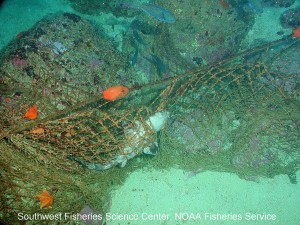
The National Fish and Wildlife Foundation’s Fishing for Energy Partnership has provided a $45,000 grant to the NSGLC at the University of Mississippi School of Law for the work.
OXFORD, Miss. – Abandoned and lost fishing gear can cause tremendous damage to marine creatures, but the laws and regulations concerning the removal of derelict gear vary widely. The National Sea Grant Law Center is helping eliminate the confusion in one region of the country and expedite cleanup efforts.
The National Fish and Wildlife Foundation’s Fishing for Energy Partnership has provided a $45,000 grant to the NSGLC at the University of Mississippi School of Law for the work. The NSGLC project, “Increasing Awareness of the Legal Framework Governing Removal of Marine Debris and Placement of Fishing Gear in the New England Region,” will help New England managers to assess the feasibility of implementing innovative derelict fishing gear removal strategies in their states.
“Our work is unique,” said Stephanie Showalter Otts, NSGLC director. “Rather than conducting research to build the strongest argument to achieve our client’s goal, we work with partners to solve challenging management problems through the provision of nonadvocacy research and outreach services on range of ocean, coastal and Great Lakes resources.”
The NSGLC is a leading resource for research on marine aquaculture, aquatic invasive species and public access to beaches.
Lost nets and other heavy fishing equipment can damage ecosystems as they are moved by tides and waves along the sea floor. They also can affect navigational safety, damage active fishing equipment and boats, and cause economic repercussions for coastal industries and communities across the country.
The laws and regulations governing the removal of abandoned fishing gear vary by fishery and state. The NSGLC will provide information on the legal framework governing derelict fishing gear removal and how existing state marine debris programs are authorized.
The NSGLC also will partner with the Rhode Island Sea Grant Legal Program at the Roger Williams University School of Law to perform research on vessel navigation laws and restrictions on the placement of commercial fishing gear within shipping and boating lanes.
“This research is essential for the development of proactive programs in the region,” Otts said. The two-year project will provide marine debris managers with the information they need to undertake desired legal reforms and implement new control strategies, she explained.
The Fishing for Energy Partnership is supported by the Covanta Corp. and the National Oceanic and Atmospheric Administration Marine Debris Program.
The partnership, launched in 2008, reduces the amount of abandoned fishing gear that accumulates in U.S. coastal waters by offering commercial fishermen a no-cost opportunity to dispose of old, lost or unusable fishing gear at designated locations throughout the country.
Collected gear and debris is recycled and processed to generate electricity at Covanta Energy-from-Waste facilities.
The partnership also awards grants that prevent gear loss, minimize the impact of lost gear and remove derelict gear from the ocean.
For more information on the NSGLC, go to http://nsglc.olemiss.edu/.